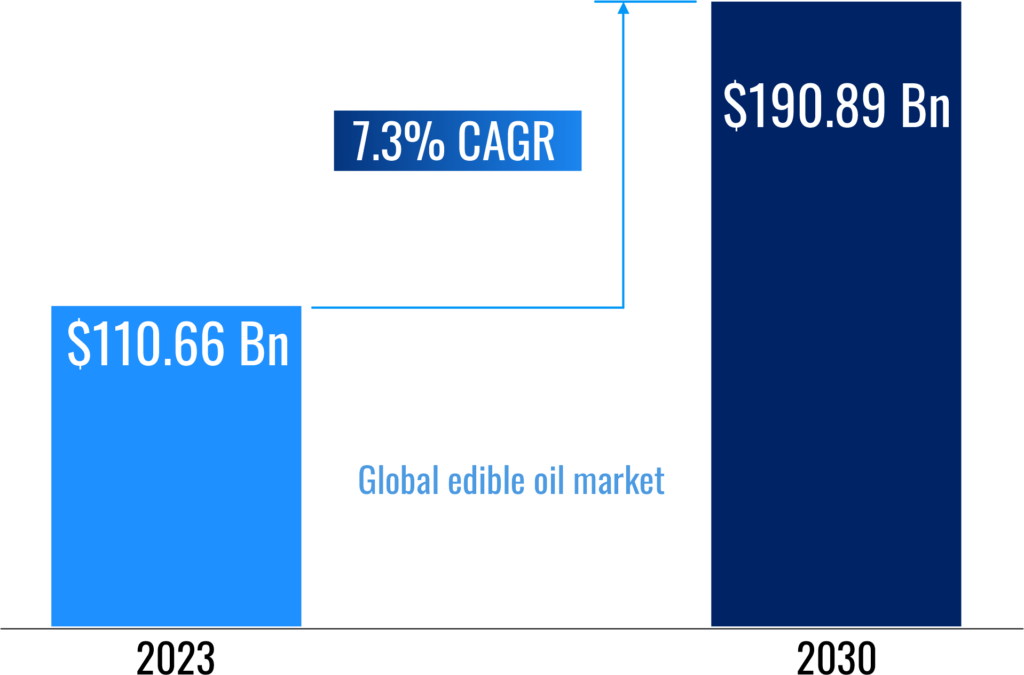Today, we are surrounded by FMCG, particularly packaged foods. Almost all packaged foods are prepared using edible oils, primarily palm oil. This oil has negative consequences for our health. Let’s look into the benefits of sustainable oils on our health and find healthier alternatives.
In a world where sustainability is becoming more and more important, finding healthier palm oil substitutes is becoming crucial. Customers and businesses are looking for more morally and environmentally responsible solutions due to worries about deforestation, biodiversity loss, and environmental damage.
From plant-based oils to technological advancements in extraction methods, the landscape of alternatives to palm oil is evolving rapidly.
Signicent’s Technology Scouting team conducted research to find novel alternatives for palm oil, identifying solutions that offer both health benefits and environmental sustainability.
Drawbacks of Palm Oil:
- Consumption of products containing palm oil has been linked to health issues such as obesity, heart disease, and high cholesterol levels due to its high saturated fat content.
- Palm oil production is a leading cause of deforestation in tropical regions, resulting in the loss of biodiversity.
- Palm oil’s high saturated fat content raises health concerns related to cardiovascular diseases and obesity.
Is There a Healthier Oil Choice for Packaged Foods?
Replacing pure palm oil with a combination of sunflower oil and palmolein could potentially reduce the chips’ saturated fat level, making them healthier. Sunflower oil’s high polyunsaturated fat content can improve the heart health profile.
“The lesser the amount of saturated fat, the better the oil”
Saturated Fat and Health: Saturated fats are known to raise the levels of LDL (low-density lipoprotein) cholesterol in the blood. High levels of LDL cholesterol are associated with an increased risk of heart disease and other cardiovascular problems.
Unsaturated Fats and Health: Oils with higher proportions of unsaturated fats, whether monounsaturated or polyunsaturated, are generally considered to be healthier options. These fats have been associated with lowering LDL cholesterol and reducing the risk of heart disease when consumed in moderation.
Less Saturated Fat, Better Health: Oils that are low in saturated fat and higher in unsaturated fats are often recommended for maintaining heart health and overall well-being.
By choosing oils with lower levels of saturated fat, you are opting for a product that is less likely to contribute to elevated cholesterol levels and related health issues.
Each year Signicent provides consultancy to hundreds of organizations to help transform their innovations to value.
Alternative Solutions:
Among all the oils, olive oil is considered one of the healthiest for cooking. It offers health benefits and a distinct flavor profile, commonly used in Mediterranean cuisine
Few healthy options to Consider:
- Soybean Oil is rich in polyunsaturated fats, including omega-3 fatty acids, which are beneficial for heart health. It’s commonly used for cooking and frying.
- Safflower Oil has a high amount of polyunsaturated fats and is known for its light flavor and high smoke point, making it ideal for frying and sautéing.
- Canola Oil is low in saturated fat and high in monounsaturated fats. It’s versatile and commonly used in cooking, baking, and salad dressings.
- Olive Oil is especially extra virgin olive oil and high in monounsaturated fats and antioxidants. It’s considered one of the healthiest oils for cooking and drizzling over salads.
- Sunflower Oil is high in vitamin E and low in saturated fats. It has a high smoke point, making it suitable for frying and baking.
- Rice Bran Oil contains a good balance of monounsaturated and polyunsaturated fats. It also has antioxidants like vitamin E and oryzanol, which may benefit heart health.
- Corn Oil is rich in polyunsaturated fats and phytosterols, which can help reduce cholesterol levels. It’s often used for frying and in margarine production.
Palm oil has a saturated fat content of 48-79%, whereas safflower oil and canola oil contain just 10% and 7% saturated fat, respectively.
In comparison, olive oil contains about 14% saturated fat, making it a healthier option.
Benefits of Olive Oil:
- Rich in Monounsaturated Fats
- Supports Brain Health
- Digestive benefits like gastritis and ulcers
- Lower Risk of Chronic & heart diseases
Global Olive Oil Market:
According to Signicent’s Market Research, the global olive oil market is expected to expand at a CAGR of 3.6% from US$ 14.71 Bn in 2023 to reach a value of US$ 19.23 Bn by 2030 over the forecast period.
Key players:
These are the well-known key players operate in the category of oil and agriculture industry.
- Cargill, Incorporated
- Archer Daniels Midland Company (ADM)
- Bunge Limited
- Louis Dreyfus Company (LDC)
- Wilmar International Limited
Market research:
As per Signicent’s Market Researchers, the global market for Edible oils is likely to reach values in the ranges shown below.

About Signicent LLP
We assist businesses globally in their technology innovations, R&D, new product development, patents, valuation, product commercialization & market research needs.
Services Offered:
- Technology Intelligence
- Market Research
- Patent Landscape
- Technology gap analysis
- Design Patent Search
- Portfolio Analysis
- Freedom to operate
- Bio Sequence Search
- Innovation pipeline identification
- Chemical Structure Search
- Patent Invalidity Search
- Manufacturers Search/ Supplier search
- Patent Licensing Services
Elevate your Innovation and Research with Signicent’s cutting edge approach to assist you with Technology and Market related matters alongside the IP aspect of the analysis.
